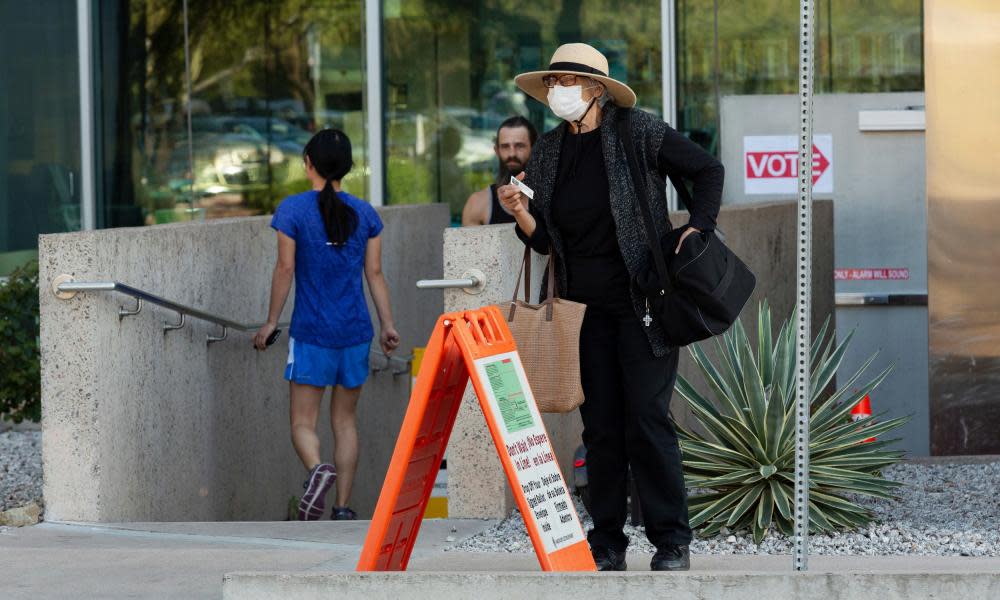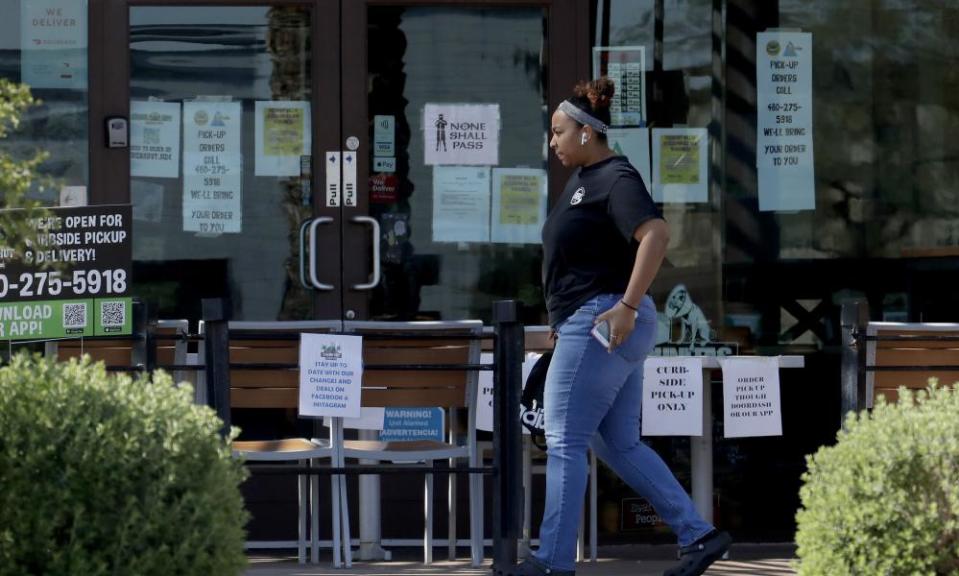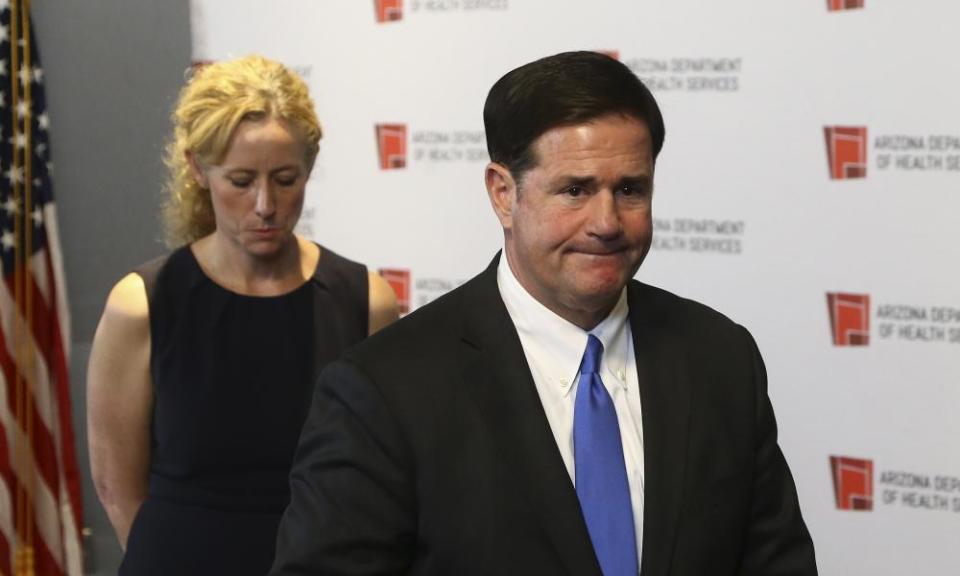'It's like a sick experiment': Arizona lags behind as states urge residents to stay home

For the last three weeks, 57-year-old Ann O’Connor has avoided leaving her home in Paradise Valley, Arizona, due to the Covid-19 pandemic. As a cancer survivor with asthma, she is considered high risk for severe illness, and she wants to do her part to stop the virus’ rapid spread.
But others here are not taking the same precautions. O’Connor’s house looks on to a private golf course, and she spends her days watching foursomes tee off, buy refreshments and pile into golf carts. She sees neighbors greet each other with hugs.
“It’s really disconcerting because you just see these people and there’s no social distancing,” O’Connor said in a phone interview from her home. “It is like a huge, sick experiment,” she added about the lack of consistent action across the country.
O’Connor has children living in Washington, California and Colorado, where governors have issued state-wide shelter-in-place orders and shut down all but essential businesses. She had expected it would just be a matter of time before the rest of the country followed suit.
But while more than 25 states and dozens of counties have ordered residents to stay home, 10 states, including Arizona, Arkansas, North Dakota, South Dakota and Wyoming, have no such orders at the state, county or city level.
Related: Pelosi accuses Trump of costing US lives with coronavirus denials and delays
“Many of you have asked if or when the state will move towards a stay-at-home policy,” Arizona’s governor, Doug Ducey, a Republican, said at a 23 March press conference. “The answer is, not at this time.”
He added: “The CDC is not there yet. Arizona is not there yet. We’re not at the same stage as other states.”
Ducey has barred cities and counties from issuing their own shelter-in-place orders, a move which has frustrated mayors in the state who would like to take more aggressive steps.
The governor has closed Arizona schools and libraries statewide and ended elective surgeries. In counties with confirmed cases of Covid-19, he has ordered movie theaters, gyms and bars to close, and restaurants to switch to take-out. But other non-essential businesses are open, and the governor has named dozens of “essential” businesses that cannot be ordered to close even if he issues a shelter-in-place order.

His list of essential businesses includes golf courses and “personal hygiene services”, which has been interpreted to include barbers, hairdressers and nail salons.
Gregg Gonsalvez, a professor of epidemiology at the Yale School of Public Health, said Ducey’s approach was inconsistent with mainstream public health guidance. Stay-at-home orders don’t just protect residents, public health experts say, but are crucial to slowing down the spread of Covid-19 so an explosion of infections does not overwhelm hospitals with limited beds, ventilators and Personal Protective Equipment for doctors.
“There’s no virtue in waiting,” Gonsalvez said. “Social distancing and business closures are meant to be a preventative. They’re not to be seen as something you do when it gets really bad – it’s to keep it from getting really bad.”
As of Sunday morning, Arizona had 919 confirmed Covid-19 cases, up 18% from the day before. But that is likely to be a severe undercount. Due to testing delays and shortages, less than 14,000 tests had been conducted in the state, which is home to more than 7 million.
“I am very concerned that we are behind the curve on this one,” said Dr Georges Benjamin, executive director of the American Public Health Association. Too many communities were thinking “it’s not here yet, we have time”, Benjamin said, when instead they should be trying to “get ahead of it in a defensive manner”.
Leyna Negron, a salon owner, called it “ridiculous” to classify beauty salons as essential.
“We cannot comply with CDC guidelines and stay six feet away from our clients,” Negron said. She does facials and nails at her salon in Apache Junction, 30 miles east of Phoenix. “I have many elderly clients and I don’t want to put them at risk.”
She has decided to voluntarily close after 14 years in business. But she said it would have been easier had the governor made the call to shut everyone down.
“I just want to know what to do and what help is coming,” Negron said.
At a time when more than 3 million Americans have filed for unemployment, Arizonans whose workplaces remain open say they feel lucky to still have jobs. But they are also fearful about the risk of working.
Ricardo Zúñiga, a 28-year-old college student, said a pre-existing health condition made him nervous about continuing to deliver flowers for a large company, “but I’m afraid I’ll simply be replaced and not have a job at all when this situation is over if I choose to stay home”.
He’d like to see politicians shut down all non-essential businesses.
Related: Arizona man dies after attempting to take Trump coronavirus 'cure'
“We should already have been locked down,” said Parris Wallace, a 34-year-old director of a Phoenix not-for-profit organization. She has spent the past 10 days overcoming symptoms that are consistent with Covid-19.
In a phone interview from her house, where she is quarantined, Wallace’s voice was still raspy as she described gasping for air, a burning sensation in her lungs, fever and extreme fatigue. She will not receive her Covid-19 test results for several more days.
The latest guidance from state health officials discourages primary care providers from testing patients, because there are “not enough supplies to meet testing demand”. Patients whose symptoms are severe enough to seek care at a hospital are prioritized, which was the case for Wallace. But without more widespread testing, she worries, Arizonans do not have a sense of how pervasively the disease is spreading.
“Like knowing what I know, and going through it, I just cannot stress enough to people: just stay home, stay indoors,” Wallace said.
Dr JulieAnn Heathcott, a Scottsdale OB-GYN, started a Change.org petition urging Ducey to “Lockdown Arizona”.
The petition had earned more than 163,000 signatures as of Sunday morning.

But opponents like Rhiannon Zarr, who owns a painting company in the Phoenix area, are hoping more people will go back to work soon. “I do believe Americans have now learned how to clean, sanitize and distance ourselves to a safe limited area,” Zarr said.
Some officials have even second-guessed the closures that have happened, sending mixed signals to residents.
Last week, a leading public health official in Arizona’s largest county announced she would not have recommended closing schools, libraries and restaurants.
“I would try to minimize spread, maximize distance, but keep facilities open because I think this is going to be a long haul,” said Dr Rebecca Sunenshine, the Maricopa county department of public health’s medical director for disease control, at a public meeting on 23 March.
Adding to the chaos, the state emergency management director resigned this weekend, citing a “lack of communication and transparency” in Arizona’s Covid-19 response, according to the Arizona Republic.
Meanwhile, some mayors in the state are growing restless. The city of Tucson has called on Ducey to issue a statewide shelter-in-place order.
Regina Romero, the Tucson mayor, ordered all businesses in her city not designated as essential by the governor to close and recommended salons and barbers do the same. “We cannot afford to wait any longer,” she said in a 27 March statement. “Covid-19 is not waiting and neither can we.”

 Yahoo News
Yahoo News 
